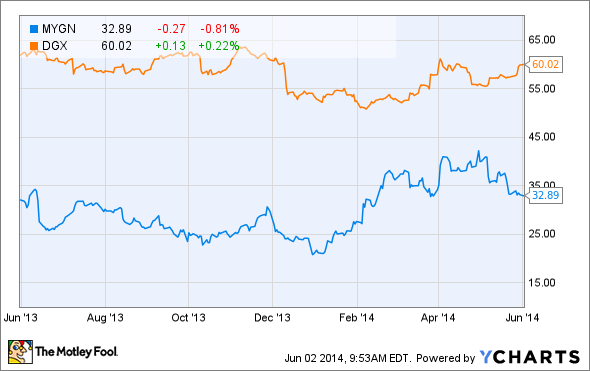European and U.S. regulators this year are considering approval for AstraZeneca's (AZN 0.49%) Olaparib, a drug designed to treat ovarian cancer patients with a specific mutation to the BRCA gene.
Approval could have an impact on a variety of other companies, including BioMarin (BMRN -0.93%) and AbbVie (ABBV -1.03%), both of which are developing their own BRCA targeting therapies.
That effect could extend to diagnostic companies, including Myriad Genetics (MYGN 0.16%) and Quest Diagnostics (DGX 0.62%), which market tests to determine if patients have that BRCA mutation.
Gene-targeting success
AstraZeneca rescued Olaparib from the dustbin by conducting a retroactive analysis on a failed midstage study, which enabled them to show that those with the BRCA mutation respond far better to Olaparib than patients without the BRCA mutation.
In that study, Olaparib patients identified with the BRCA mutation saw their median time to disease progression increase to more than 11 months, versus just four months for those receiving placebo.
That finding was encouraging enough that AstraZeneca moved Olaparib into phase 3 trials for use in BRCA-mutated ovarian patients, leading to a filing for EU approval last fall and a filing for FDA approval earlier this year. Decisions from both sides of the Atlantic are expected later this year. The FDA recently granted Olaparib priority review status, which reduces the review timeline to six months from the standard 10 months. Based on that, AstraZeneca said the FDA's advisory committee will meet to discuss the drug in late June, and that an agency decision is expected in early October.
A green light from regulators for Olaparib would help rekindle investor interest in BioMarin and AbbVie, as both companies are also working on their own BRCA gene-targeting treatments.
BioMarin's BMN-673 is in phase 3 trials as a treatment for BRCA-mutated breast and ovarian cancer, and to date studies have produced solid results. In midstage trials, 86% of patients receiving BMN-673 saw a clinical benefit, including 50% with either a complete or partial response.
AbbVie's Veliparib also posted solid midstage trial results, with 52% of breast cancer patients receiving the drug seeing a pathologic complete response, versus just 26% for those receiving standard paclitaxel treatment. Veliparib has also shown efficacy in pre-treated ovarian cancer patients, including in those who have developed a resistance to platinum-based therapies.
While all three of these future BRCA targeting drugs could eventually face off for market share, their approval would kick off a separate battle for business between gene-testing companies including Myriad and Quest.
Myriad's BRCA gene tests are being used by all three of these drugmakers during their respective trials, and BRCA testing accounted for $120 million of Myriad's $170 million in cancer testing revenue last quarter.
However, Myriad's monopoly in BRCA testing was opened up to competition following a court decision last year. Companies such as Quest Diagnostics have stepped up to offer their own BRCA tests in a market that may prove to be worth hundreds of millions in annual sales.
Fool-worthy final thoughts
AstraZeneca is the first to put a BRCA drug before regulators, and there's no guarantee that the troubled product will pass muster. If it does, it could help clear the way for BRCA drugs from BioMarin and AbbVie and result in significant revenue for companies such as Myriad and Quest Diagnostics.
That's because breast cancer is among the most common of cancers, with more than 230,000 new cases diagnosed annually in the U.S. BRCA1 and BRCA2 mutations occur in 5% to 10% of all breast cancers and 15% of ovarian cancer cases, so doctors will need to test patients to determine whether they're eligible to receive these drugs.





